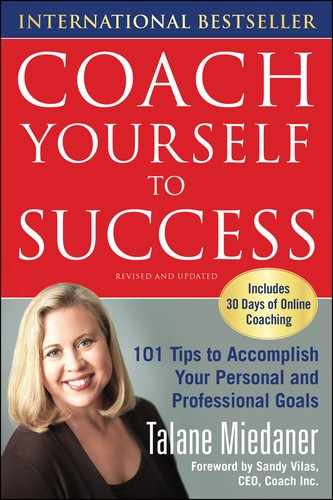TIP 61
STRENGTHEN YOUR STRENGTHS
I think knowing what you cannot do is more important than knowing what you can do. In fact, that’s good taste.
Many of us think we have to do it all and be good at everything. It’s part of our independent spirit. We live in a time and in a civilization where we can actually afford not to do it all. Yet, for some reason, we still think we should. We think we have to go to work, come home, cook the gourmet meal, clean the house spotlessly, take care of the children, have an extraordinary social life, take classes to improve ourselves—all in the same day or week. What if you just strengthened your strengths, really took a look at what you are good at, focused on that, mastered that, and delegated the rest?
People who really master a strength tend to easily attract the good life. The Beatles were a great band and honed their skills in Berlin before becoming an “instant hit” in England. Bill Gates spent hours as a kid learning how to program computers before they were readily accessible to the public, giving him an advantage when personal computers became affordable. We often don’t see the vast amount of work behind the scenes that goes into becoming truly great. Doing a lot of things fairly well is not nearly as valuable as doing one thing extremely well. Mastery is an art, and even if you have the natural gift for something, it usually takes time, practice, and dedication to make that gift pay off. Tiger Woods may be naturally athletic and have a gift for golf, but he has honed the sport to an art form with practice, work, concentration, and lots of coaching. Do we care if he can balance his checkbook? Of course not. Stop trying to be good at everything and instead focus on your strengths.
If you are still having a hard time letting go of all the things you could do, think of it in terms of how much energy something costs you. How much does something cost you in terms of your well-being and happiness? When you are agonizing over a task or just procrastinating, consider what it is worth to you.
Jonathan, a brilliant computer programmer, was smart enough to be able do just about anything he set his mind to. So, when the roof of his house started to leak, he decided to fix it himself. I suggested that he delegate the roof job to a professional to free up his time to do some programming he had been meaning to do for over a year. He ignored the advice, decided to fix the roof, and save the money. On his way up the ladder, he fell off and broke his ankle in several places. While he missed the subtle message (Tip 69), he did get the hint at this point and hired a contractor to do the roof. With his foot elevated, he got a ton of valuable programming done. Unfortunately, he didn’t have medical insurance (Tip 30), so now he not only has to pay for the roof, but he also has to pay thousands more in doctor bills.
Anytime you do something you hate to do, it saps your energy. Look at your life and write down five things you have been doing that you would really rather not do. Then find out how much it would cost to hire an expert to take care of that task, such as an accountant, a housekeeper, a laundry service, a cook, a babysitter, an assistant, a computer tutor, or a plumber. It usually isn’t as expensive as you think. In the long run, you may end up saving money. Now that you’ve off-loaded the stuff you don’t enjoy doing, you’ll have more time to work on mastering and developing your strengths and natural talents.
In most corporations, if you are good at your job, you are likely to get promoted to a management role that provides more income, but perhaps less pleasure and satisfaction at work. You may have given up the work you had a talent for and ended up doing managerial tasks that may not be aligned with your true strengths. Most people assume that the more talents and abilities you have, the better, and the more likely you are to be successful. This isn’t necessarily true. If you have a hardwired ability, then it will demand expression in order for you to feel satisfied. If you aren’t using your abilities in your work, you’ll need to find ways to use them in your personal time. It is great to have abilities but then you also need to find a way to express them—therein lies the rub! Most jobs require the use of only one or two abilities, which can lead to dissatisfaction at work if you have many abilities. (To learn more about your own natural talents and innate abilities, see “The Career Change Kit” in Appendix D).
Congratulations on your first step toward mastery!
